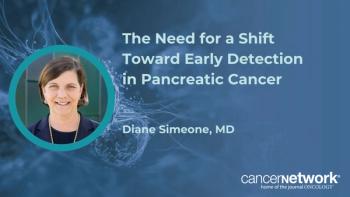
Oncology NEWS International
- Oncology NEWS International Vol 8 No 2
- Volume 8
- Issue 2
Long-Term Follow-up of Rituximab Shows Good Response Duration in NHL
HOUSTON-Long-term follow-up of the rituximab (Rituxan) pivotal trial in relapsed or refractory non-Hodgkin’s lymphoma (NHL) shows a median response duration of almost a year. The anti-CD20 chimeric monoclonal antibody was approved last year for use in relapsed or refractory low-grade or follicular NHL.
HOUSTONLong-term follow-up of the rituximab (Rituxan) pivotal trial in relapsed or refractory non-Hodgkins lymphoma (NHL) shows a median response duration of almost a year. The anti-CD20 chimeric monoclonal antibody was approved last year for use in relapsed or refractory low-grade or follicular NHL.
In a poster presentation at the American Society of Hematology meeting, Peter McLaughlin, MD, of M.D. Anderson Cancer Center, reported the long-term follow-up results as well as a comparison of response data with internal and external controls.
Patients were treated with rituximab at 375 mg/m² weekly for 4 weeks. Using intention-to-treat analysis, the overall response rate in the 166 study patients was 48% (CR 6%, PR 42%). Median duration of response was 11.6 months, and median time to progression was 13.2 months. Of 80 responders, 20 (25%) have an ongoing reponse, with a duration range of 19.3+ months to 36.7 months.
The overall response rate did not vary significantly with the number of prior chemotherapy courses but decreased, as expected, with the number of relapses: 57% for one relapse, 46% for two relapses, and 38% for three.
Refractory patients with zero relapses (never responded, never relapsed) had an overall response rate of 29% (6 of 21). Responses were confirmed on CT scans in a blinded audit by independent lymphoma experts using rigorous response criteria .
The researchers analyzed 22 of the most important factors for NHL prognosis, including age, bulky disease, IWF histologic type, prior autologous bone marrow transplant (ABMT), bcl-2 positivity, bone marrow involvement, extranodal disease, number of relapses, and resistance to the last chemotherapy course. Only three factors emerged as significant: histologic type, bcl-2 status at baseline, and prior ABMT.
Historical Controls Used
Although comparison with randomized controls would have been ideal, there were problems with this approach. Selection of an appropriate control group in these NHL patients is difficult, Dr. McLaughlin said, because:
(1) there is no standard treatment; (2) patients may find randomization into the chemotherapy arm less desirable than the immunotherapy arm (due to toxicity and longer time required for treatment); and (3) randomized studies evaluating treatments with similar response rates require large numbers of patients, are costly, and take several years to complete.
Instead, the researchers used two types of historical controls: internal, in which the patients served as their own controls, and extermal, using comparisons to reports in the literature.
Intention-to-treat analysis of responses with patients serving as their own controls found no significant difference in duration of response compared to responses with prior therapy. As expected, Dr. McLaughlin said, overall response rates decreased with increasing number of relapses. Nevertheless, patients with three relapses had a 38% overall response rate, and refractory patients had a 29% overall response rate.
Using historical data from the literature, rituximab compared favorably to other single-agent therapies such as cladribine (Leustatin) and fludarabine (Fludara) (see Table).
A short (four infusions, 22 days) outpatient course of rituximab produces responses in patients with relapsed/refractory low-grade or follicular NHL of equivalent duration to prior chemotherapy. The overall response rate obtained with rituximab compares favorably to that of other single agents, he concluded.
Initial studies in combination with chemotherapeutic and biologic agents have shown promising results, he added, and rituximab is now being evaluated in large randomized studies in patients with intermediate/high-grade NHL.
Articles in this issue
about 27 years ago
Paclitaxel Plus Mitoxantrone for Poor-Prognosis Breast Cancerabout 27 years ago
Pros and Cons of Different Approaches to Chemoradiationabout 27 years ago
Less Cardiotoxicity With Liposomal Doxorubicinabout 27 years ago
Doxorubicin Appears to Change Natural History of HER-2+ Cancer’sNewsletter
Stay up to date on recent advances in the multidisciplinary approach to cancer.





































